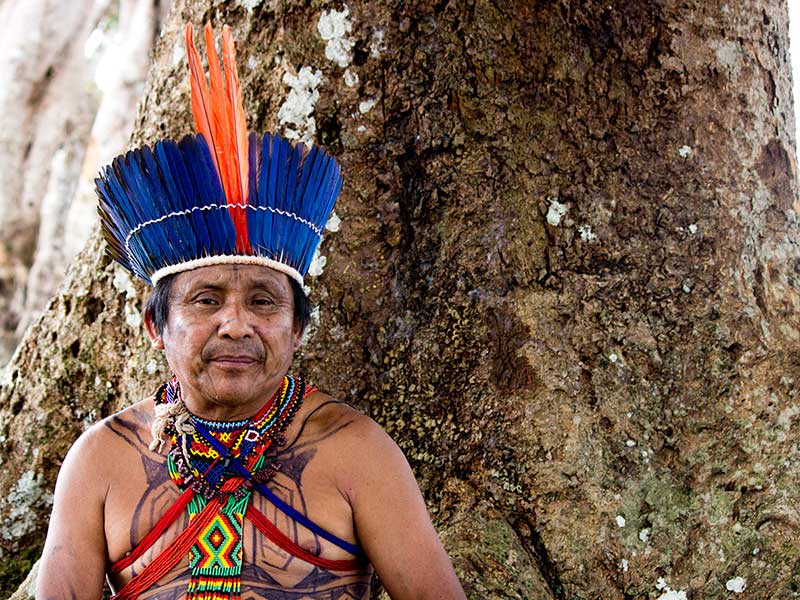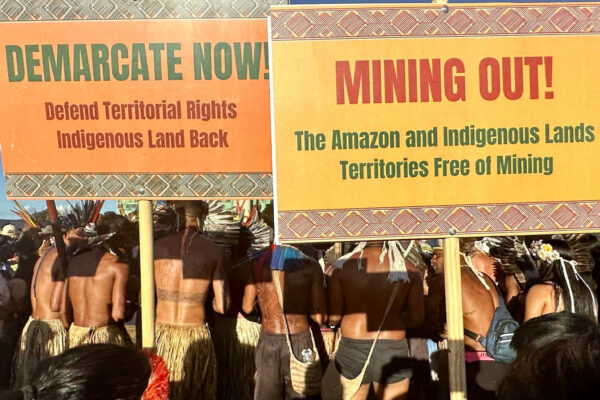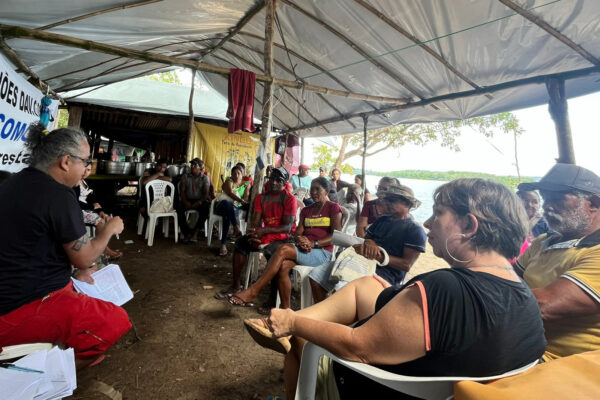
“I say this because I know that if you want to take care of the forest, you need to invest in us – indigenous peoples – because no one takes better care of the forest than we do.”
Antonio Dace Munduruku
According to the Munduruku, Karusakaibu is the god who created their people, the animals and the myriad of their cultural artifacts. What many don’t know is that they weren’t known always known as the “Munduruku” people.
In the 18th century the State of Para was divided mostly between Kayapó and Munduruku territories (they are historically enemies). The Munduruku where known as “the beheaders” because of their ruthless favored murdering tactic when capturing enemies.
Later, when outsiders began visiting their region in the 19th century, they were coined the “Munduruku” – meaning “red ants” – by their enemies the Parintintin people, who saw that they were numerous, notoriously angry, attacked en masse and very hard to kill.
The Munduruku people have never lived in peace. They are warriors; today the difference is they now fight with paper and pen. They say now that their best defense is their word and the law to protect them. No law, however, seems to stop devious plans the government has for destructive dam projects in the Tapajós region where they live.
“The government sends the national force, the army, the federal police here as if we were criminals instead of sending them to where the crimes actually happen,” said Antonio Dace Munduruku in a conversation during a recent National Assembly. “The government keeps trying to intimidate us, but we will never lower our heads.”
And they will not back down. The Munduruku gathered to discuss strategies to continue resisting governmental plans and pressure.
“The government sees us as objects, rather than to be proud that we still have this alive and standing forest,” declared Antonio. “I say this because I know that if you want to take care of the forest, you need to invest in us – indigenous peoples – because no one takes better care of the forest than we do. If it weren’t for us, the cattle and the soy would have taken this whole forest. I know we are only of the size of a grain of sand but we make a huge difference. The air you breathe comes from [the Amazon]. The water you drink comes from here. And so, by killing us, you are killing nature and therefore yourselves.”
With such messages in their minds the Munduruku continued on from the assembly straight to Brasilia to participate in a national indigenous mobilization.
As if it wasn’t enough to face the concurrent threats and maintain the struggle for their territroy, the new Minister of Energy and Mines Eduardo Braga declared publicly the same week that the slated São Luiz do Tapajós dam will be auctioned by the end of this year, and that the government had a “good relationship” with the Munduruku.
Appalled, the Munduruku denied such “relationship” at a press conference, reaffirming their position against the massive hydroelectric dam complex planned for the beloved Tapajós. They also took the opportunity to again request the demarcation of Sawre Muybu territory (the area which they have been demarcating themselves). Sawre Muybu is a key region for the government because the São Luis do Tapajos dam would greatly affect it and consequently make the demarcation project impossible, which is unconstitutional according to the indigenous federation FUNAI.
The Munduruku protested against the lack of dialog and specifically the lack of the Free Prior and Informed Consultation, as required by ILO 169 of the Brazilian constitution.
“This plan for dams humiliates us and takes away our physical and moral dignity!” Antonio cried out in protest. “It cannot be considered clean energy!”
The Munduruku continue fighting and have asked for support from the world.
“Our goal now is to seek international support because Brazil does not value the Amazon. If you value the Amazon, then support us because we protect the forest.”
Antonio Dace Munduruku, on behalf of the Munduruku people
OPEN LETTER FROM THE MUNDURUKU PEOPLE TO THE BRAZILIAN PEOPLE
We write in the name of the Munduruku people, represented here by General Chief of the Munduruku Arnaldo Caetano Kabá; Chief Juarez, from the Sawre Muybu village; Josias Manhuari, coordinator of the Indigenous Association Pussurú; Maria Leusa, coordinator of the Iperêg Ayû Movement; Adalto Kay, Warrior Chief; Lucivaldo Karo, leader from Praia do Mangue village; and Valdeni Munduruku, leader from Teles-Pires village.
We denounce and repudiate the statement from the Minister of Mines and Energy, Eduardo Braga, concerning his comment during a public hearing at the National Congress on April 15th, 2015, in which he claimed “to have a good dialogue with the Munduruku” about the dams on the Tapajós river, when in reality at no moment has the government or the Brazilian state opened up such a space for dialogue.
Instead of dialogue, the government sent armed forced to our region to attempt to intimidate us, assuring that researchers [could] conduct [dam viability] studies on our territory, even against our will.
For this reason, in past assemblies and protests, we have already protested the construction of these dams on our rivers, which threaten our way of life. Through this letter, we reiterate that we do not accept this project death from the government.
We affirm that we sought dialogue with the government at the beginning of the year, when we delivered a consultation protocol prepared by the Munduruku people into the hands of the Minister Miguel Rosseto, from the office of President’s Secretary General, in which we expressed how we seek to be consulted, and to which NEVER received an answer from the federal government.
We take this opportunity to demand the demarcation of the Indigenous Territory of Sawre Muybu, in the Middle Tapajós basin.
We want to reaffirm that we will not accept these projects on our territories and we will bravely resist [their construction] for our lives.
Sawe
Sawe
Sawe
Letter translated by Diana Oliveira













